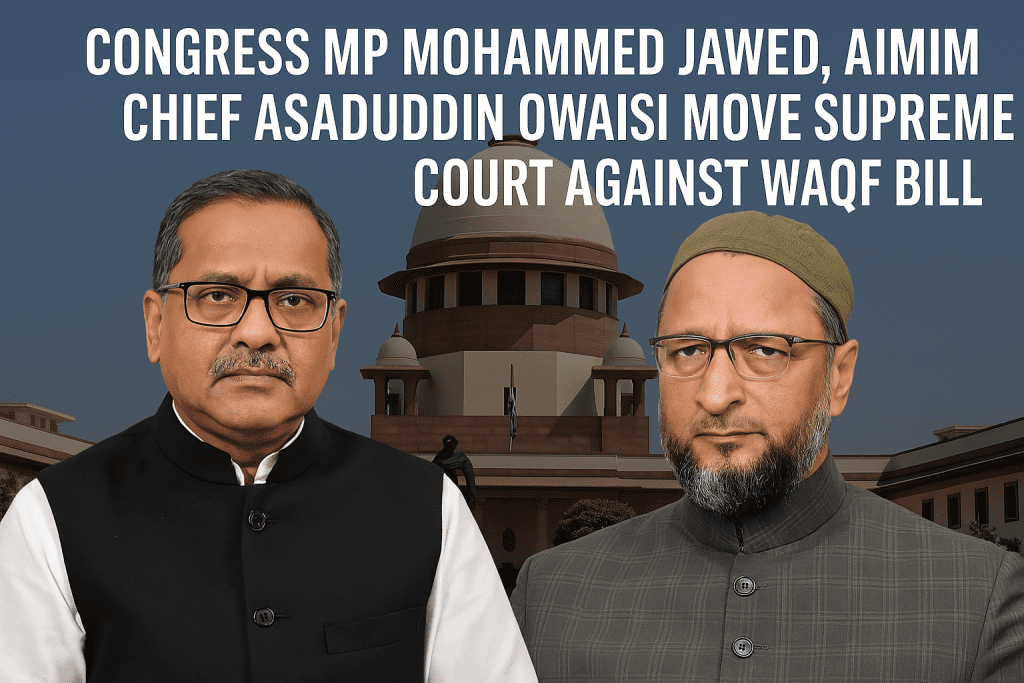Owaisi Move Supreme Court Against Waqf Bill
The Waqf Bill has become a contentious issue in Indian politics, with several leaders raising concerns over its provisions. Recently, Congress MP Mohammed Jawed and AIMIM chief Asaduddin Owaisi have moved the Supreme Court against the proposed Waqf Bill, citing its potential impact on Waqf properties and religious rights. The challenge to the bill has sparked a nationwide debate about its constitutional validity and implications for the Muslim community in India.
What is the Waqf Bill?
Waqf is a religious endowment in Islamic law where a property or asset is permanently dedicated for religious or charitable purposes. These properties are managed by Waqf boards, which function under government regulations.
Key Provisions of the Waqf Bill
- Increased Government Control: The bill proposes greater oversight by state and central governments in the management of Waqf properties.
- Changes in Property Management: It aims to streamline the process of leasing and selling Waqf properties.
- Stricter Regulations: New laws would require detailed documentation and transparency in managing Waqf assets.
- Potential Evictions: There are concerns that certain provisions could lead to displacement of occupants from Waqf properties
Impact on Waqf Properties
One of the primary concerns raised is that the bill may pave the way for the government to take over Waqf properties, potentially leading to
- Loss of ownership by Waqf boards.
- Commercialization of religious endowments.
- Legal battles over property rights.
- The Supreme Court Challenge.
- Legal Arguments in the Petition.
The Legal Challenge
Mohammad Jawed, who represents Kishanganj in Bihar and is one of the Congress’s prominent Muslim leaders, moved the Supreme Court soon after the Bill was passed. In his petition, he contended that the law violates the constitutional rights of minorities, particularly their right to manage religious and charitable institutions under Article 26 of the Constitution.
Jawed warned that repealing the Waqf Act would effectively “rob a community of its right to preserve its cultural and religious heritage.” He called the Bill “discriminatory” and a blow to India’s secular fabric.
AIMIM’s Owaisi Joins the Resistance
AIMIM chief and Hyderabad MP Asaduddin Owaisi echoed similar concerns and called the Bill “anti-Muslim.” In a fiery statement, Owaisi questioned the rationale behind targeting Waqf properties, arguing that no similar actions had been taken against properties managed by other religious communities. He has also indicated that his party will join the legal battle to oppose the repeal.
“We will not let this go unchallenged. This is not just a legal matter; it’s about the constitutional guarantee to minorities,” Owaisi said.
Waqf Repeal Bill: A Clash Between Constitutional Principles and Property Politics
Jawed and Owaisi Take the Fight to Court
AIMIM’s Asaduddin Owaisi echoed the sentiment, calling the Bill “an anti-Muslim overreach.” He also questioned the absence of similar scrutiny over the charitable and religious trusts of other communities.
Voices from the Ground
For many Muslims in India, the Waqf isn’t just about land. It’s about identity, history, and self-respect. In cities like Hyderabad, Lucknow, Bhopal, and Delhi, where Waqf properties are a vital part of local Muslim ecosystems, anxiety is growing.
Local clerics, teachers in Waqf-funded schools, and even shopkeepers on Waqf land are worried about what happens next.
Read More:- Articles and Blogs
Conclusion
The passage of the Waqf Repeal Bill has opened up more than a legal debate — it has ignited a nationwide conversation about the balance between reform and rights, transparency and tradition. While the government argues it’s a step toward accountability, critics warn that it risks marginalizing a community and erasing a legacy built over centuries.
As the matter now moves to the Supreme Court, it becomes not just a question of law, but of the soul of the Constitution — a test of how India protects its minorities, respects its diversity, and navigates the complex intersections of religion, property, and politics. The coming days will not only shape the future of Waqf properties, but could also redefine how the state relates to faith-based institutions in a secular democracy.

